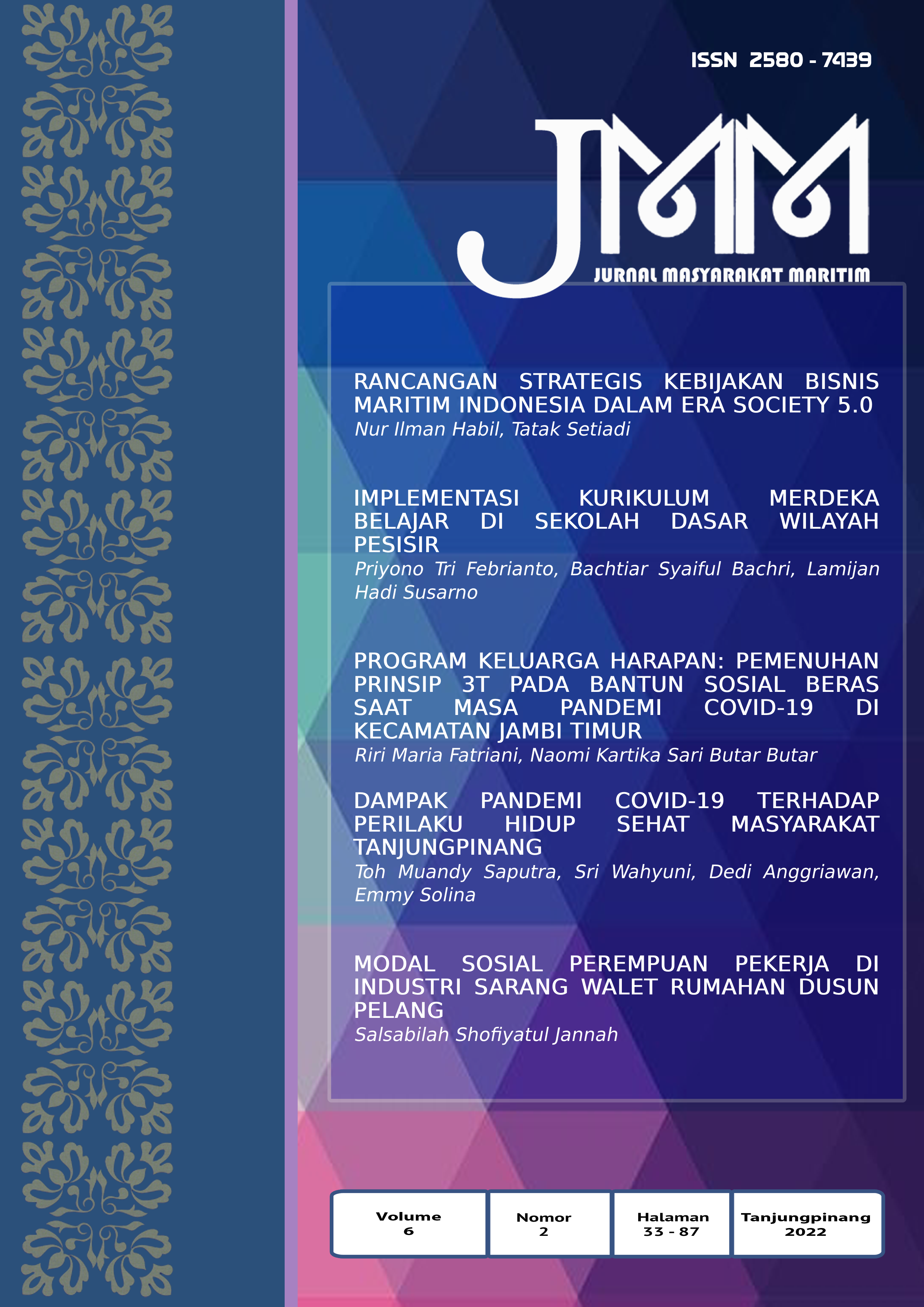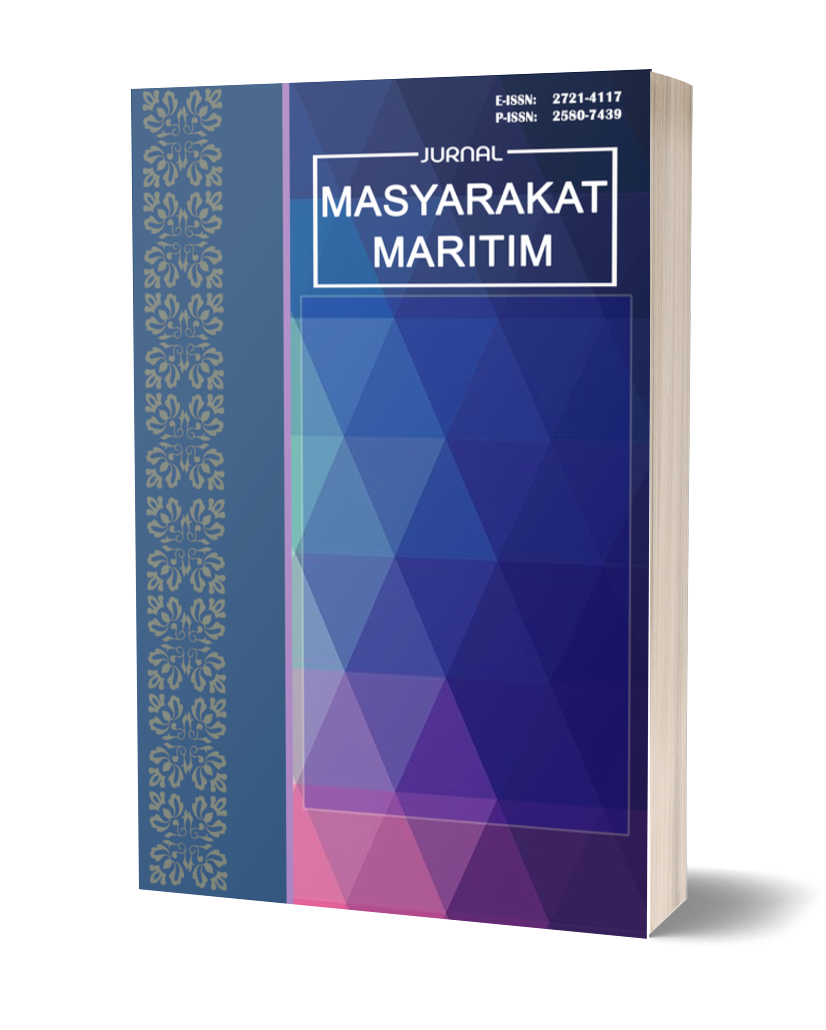Rancangan Strategi Kebijakan Bisnis Maritim Indonesia dalam Era Society 5.0
DOI:
https://doi.org/10.31629/jmm.v6i2.5178Keywords:
Strategi Kebijakan, Pembangunan Maritim, Bisnis MaritimAbstract
Maritime fulcrum today is now increasingly popular and attracts the attention of many parties, including the mass media which often raises the term in its reporting in recent times. The discovery of the term is inseparable from the idea of ??President Joko Widodo who wants to make Indonesia a world maritime axis considering the concept of Society 5.0 and to make Indonesian waters as safe waters in the world for all marine activities, and for that the government will guarantee the safety and security of sea transportation carried out by the community and business actors. The aim of this study are (1) mapping out the opportunities and threats of the maritime sector in Indonesia based on the dynamics of the domestic and global environment, and (2) to formulate the maritime development policy strategy within the framework of maritime business development. The method used is SWOT analysis. The results of the study indicate that opportunities that can be utilized for the benefit of domestic development can be seen from the potential of marine in the territory of Indonesia. The threat of the maritime sector comes from internal and external. The internal factors of inequality and disparity gap of development. The external factors threats are border disputes and lack of law enforcement, defense and security controls in border areas. The recommended policy suggested that government needs to do maritime-oriented development, connectivity through strengthening logistics and marine economy, economic development about prosperity approach and security, controlling related with the nation's authority and maritime, and reorientation of development towards maritime development with the achievement of planting more progressive capital.Downloads
References
Achmadi, Tri & Nugroho, Riant. (2022). Kebijakan Kemaritiman Indonesia. ITS & RUAS. Surabaya & Rotterdam.
Adel, Amr. (2022). Future of industri 5.0 in society: huma-centric solutions, challenges and prospective research areas. Journal of Cloud Computing: Advances, Systems and Applications, 11(40), 1-15.
Alves de Moura, Delmo. (2022). Analysis of industry 4.0 and their impact on port environmental management. Independent Journal of Management & Production (IJM&P), 13(5), 1168-1190.
Peraturan Presiden Republik Indonesia Nomor 16 Tahun 2017 tentang Kebijakan Kelautan Indonesia.
Dahuri, R. (2016). Menuju Indonesia Sebagai Poros Maritim Indonesia. Roda Bahari, Bogor.
Dewan Kelautan Indonesia. (2012). Kebijakan Ekonomi Kelautan dengan Model Ekonomi Biru. Kementerian Kelautan dan Perikanan. Jakarta.
Kementerian Perencanaan Pembangunan Nasional Republik Indonesia/Badan Perencanaan Pembangunan Nasional. (2015). Rencana Pembangunan Jangka Menengah Nasional (RPJMN) 2015-2019. Bappenas, Jakarta.
Kementerian Perhubungan DJPL. (2021). Penyelenggaraan Kewajiban Publik Untuk Angkutan Barang di Laut. Kementerian Perhubungan, Jakarta.
Kementerian Perhubungan DJPL. (2021). Dialog Publik “Kekuatan Maritim, Pengungkit Ekonomi Bangsa. Kementerian Perhubungan, Jakarta.
Kusumastanto, T. (2015). Negara Maritim. Retreived from https://www.researchgate.net/publication/270648555_Negara_MaritimProf_Tridoyo_Kusumastanto.
Mulya, Lillyana. (2013). Kebijakan Maritim Indonesia Masa Kolonial dan Pasca Kolonial. Unpublished Thesis Universitas Gadjah Mada.
Narvaez Rojaz, C., Alomia Penafiel, G. A., Loaiza Buitrago, D. F., & Tavera Romero, C. A. (2021). Society 5.0: A Japanese Concept for a Superintelligent Society. Sustainability, 13, 1-16.
Nommela, Kaidi & Kaare, Kati Korbe. (2022). Maritime Policy Design Framework with ESG Performance Approach: Case of Estonia. Economies, 10(88), 1-15.
Nugroho, Riant. (2017). Public Policy Ed. 6. PT. Elex Media Komputindo. Jakarta.
Paridaens, Hubert & Notteboom, Theo. (2021). National Integrated Maritime Policies (IMP): Vision Formulation, Regional Embeddedness, and Institutional Attributes for Effective Policy Integration. SUstainability, 13, 1-18.
Potocan, V., Mulej, M., & Nedelko, Z. (2021). Society 5.0: balancing of Industry 4.0, economic advancement and social problems. Kybernetes, 50(3), 794-811.
Rangkuti, F. (2004). Analisis SWOT Teknik Membedah Kasus Bisnis. PT. Gramedia Pustaka Utama. Jakarta.
Rifai, I., Setiadi, C. J., Renaldo, J., & Andreani, W. (2021). Toward society 5.0: Indonesia and Japan on the 21th century literacy skills. IOP Conf. Series: Earth and Environmental Sciences, 729, 1-7.














